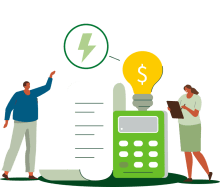Making Our Homes More Efficient: Clean Energy Tax Credits for Consumers
December 21, 2022UPDATED JULY 2024
Visit our Energy Savings Hub to learn more about saving money on home energy upgrades, clean vehicles, and more.
| EQUIPMENT TYPE | TAX CREDIT AVAILABLE FOR 2023-2032 TAX YEARS |
| Home Clean Electricity Products | |
| Solar (electricity) | 30% of cost |
| Fuel Cells | |
| Wind Turbine | |
| Battery Storage | |
| Heating, Cooling, and Water Heating | |
| Heat pumps | 30% of cost, up to $2,000 per year |
| Heat pump water heaters | |
| Biomass stoves | |
| Geothermal heat pumps | 30% of cost |
| Solar (water heating) | |
| Efficient air conditioners* | 30% of cost, up to $600 |
| Efficient heating equipment* | |
| Efficient water heating equipment* | 30% of cost, up to $600 |
| Other Energy Efficiency Upgrades | |
| Electric panel or circuit upgrades for new electric equipment* | 30% of cost, up to $600 |
| Insulation materials* | 30% of cost |
| Windows, including skylights* | 30% of cost, up to $600 |
| Exterior doors* | 30% of cost, up to $500 for doors (up to $250 each) |
| Home Energy Audits* | 30% of cost, up to $150 |
| Home Electric Vehicle Charger | 30% of cost, up to $1,000 ** |
| * Subject to cap of $1200/year ** See eligibility requirements from IRS here and a map of eligible locations | |
Q: Who is eligible for tax credits?
A: Homeowners, including renters for certain expenditures, who purchase energy and other efficient appliances and products.
Q: What do consumers do to get the credit(s)?
A: Fill out IRS Form 5695, following IRS instructions, and include it when filing your tax return. Include any relevant product and services receipts.
Q: Are there limits to what consumers can claim?
A: Consumers can claim the same or varying credits year after year with new products purchased, but some credits have an annual limit. See the table above.
Q: How do I know if my Home Energy Audit is eligible for a credit?
A: Consumers can visit this IRS page on the Energy Efficient Home Improvement Credit.
Q: What products are eligible for tax credits?
- Home clean electricity products
- Solar panels for electricity from a provider in your area.
- Home back-up power battery storage with capacity of 3 kWh or greater.
- Heating, cooling, and water heating
- Electric or natural gas heat pumps; electric or natural gas heat pump water heaters; central air conditioners; natural gas or propane or oil water heaters; natural gas or propane or oil furnaces or hot water boilers that meet or exceed the specific efficiency tiers established by the Consortium for Energy Efficiency. Eligible products here: Product List.
- Solar water heating products that are certified for performance by the Solar Rating Certification Corporation or comparable entity endorsed by the state government in which product is installed. See: https://solar-rating.org.
- Other energy efficiency upgrades
- Oil furnaces or hot water boilers if they meet or exceed 2021 Energy Star efficiency criteria and are rated by the manufacturer for use with fuel blends at least 20% of the volume of which consists of an eligible fuel. See: https://www.energystar.gov/products.
- Panelboards, sub-panelboards, branch circuits, or feeders that are installed according to National Electrical Code and have load capacity of 200 amps or more.
- Insulation materials and systems that meet International Energy Conservation Code standards. See: Building Energy Codes Program.
- Exterior windows that meet Energy Star’s Most Efficient requirements. See: https://www.energystar.gov/products/most_efficient.
Q: What if I have questions about products, standards, codes or other eligibility referenced above?
A: Ask a trusted contractor, plumber, or electrician.
Q: Where do I get even more detailed information?
A: More information on the energy efficient home improvement credit and residential clean energy property credit is available for tax professionals, building contractors, and others. See:
- IRS.gov/HomeEnergy
- Department of Treasury Taxpayer Resource Hub
- IRS FAQ about Energy Efficient Home Improvements and Residential Clean Energy Property Credits
Q: What’s the difference between a tax credit and a rebate?
A: If you're a little confused on the difference between the two, or don't know how they work—not to worry. Just review our video and go to https://www.energy.gov/save and see which home energy upgrades are right for you.


